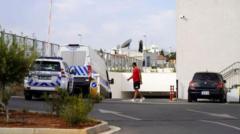Secretary of State Marco Rubio has instructed U.S. diplomats to examine the social media of certain visa applicants, aimed at restricting entry for those with anti-American sentiments, coinciding with increased deportation efforts initiated by President Trump.**
Rubio's Directive Mandates Social Media Scrutiny for Visa Applicants Amid Deportation Campaign**

Rubio's Directive Mandates Social Media Scrutiny for Visa Applicants Amid Deportation Campaign**
The Secretary of State's new order targets foreign students who criticize the U.S. or Israel as part of a wider deportation initiative.**
Secretary of State Marco Rubio has ordered U.S. diplomats to intensify scrutiny of social media content from specific visa applicants, targeting those suspected of harboring anti-American or anti-Israeli sentiments. This directive, sent in a cable to diplomatic missions on March 25, aligns with a broader initiative by President Trump to begin deportation efforts against individuals exhibiting “hostile attitudes” toward the United States and Israel.
The directive comes following an executive order by President Trump which aims to challenge perceived antisemitism, particularly among international students who have voiced opposition to U.S. actions in the ongoing conflict in Gaza. The new measures require consular officers to refer certain visa applicants—particularly student and exchange-visitor visas—to the fraud prevention unit for comprehensive social media checks, as confirmed by multiple officials.
The cable outlined specific criteria for assessing visa applicants based on their online activity. In a recent interview, Rubio emphasized the necessity to avoid allowing individuals into the country who could undermine national security or public safety, stating, "We don’t want people in our country that are going to be committing crimes and undermining our national security."
As the Trump administration bolsters its immigration enforcement strategies, this latest move marks a significant escalation in the vetting process for foreign nationals seeking to study in the U.S., raising concerns over academic freedom and the potential chilling effects on free expression.
The directive comes following an executive order by President Trump which aims to challenge perceived antisemitism, particularly among international students who have voiced opposition to U.S. actions in the ongoing conflict in Gaza. The new measures require consular officers to refer certain visa applicants—particularly student and exchange-visitor visas—to the fraud prevention unit for comprehensive social media checks, as confirmed by multiple officials.
The cable outlined specific criteria for assessing visa applicants based on their online activity. In a recent interview, Rubio emphasized the necessity to avoid allowing individuals into the country who could undermine national security or public safety, stating, "We don’t want people in our country that are going to be committing crimes and undermining our national security."
As the Trump administration bolsters its immigration enforcement strategies, this latest move marks a significant escalation in the vetting process for foreign nationals seeking to study in the U.S., raising concerns over academic freedom and the potential chilling effects on free expression.



















